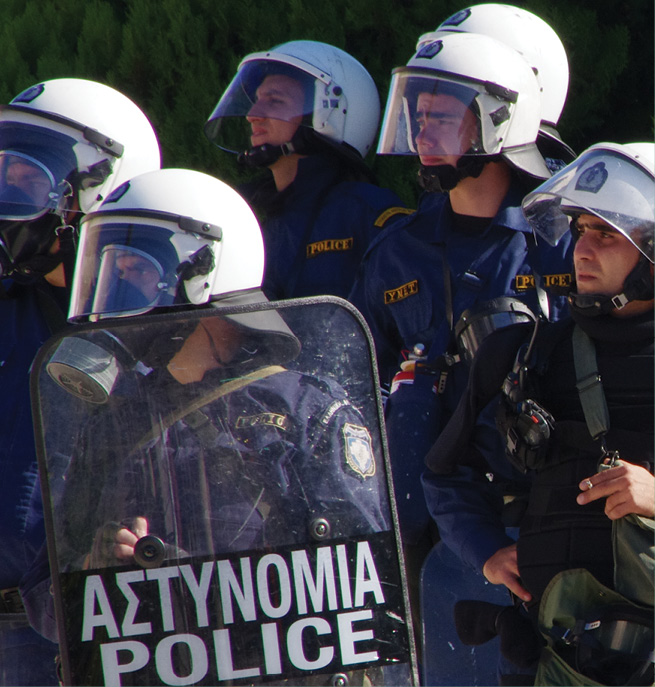Three bailouts… and counting


In the second part of a three-part series looking at the European economies worst hit by the financial crisis, eolas travels to Athens to discuss the ongoing the crisis in Greece with Dimitris Katsikas who leads the Crisis Observatory at the Athens think-tank ELIAMEP.
Economist Dimitris Katsikas is Head of the Crisis Observatory at the Athens think-tank ELIAMEP. He explains: “The Crisis Observatory was set up because of the very poor level of public discourse in Greece. There was a lot of populism, with lazy or even magic solutions being put forward and not enough data in the arguments.”
The think-tank had previously focused on Foreign and European studies and it set up the observatory in 2013 to act as a “hub of dialogue” around the financial crisis – not just in Greece – but for Europe as a whole. The think-tank has been the most prolific institution in producing new research about the crisis and has produced over 100 reports and ran over 30 events. It has also created a repository of all official documents relating to the crisis.
“The public discourse, particularly the political discourse is still quite low but people have become much more realistic and many sceptical.” However, Katsikas says that there is now a maturity that has done away with easy solutions and there has come a resignation: “Syriza not delivering on its promises was the nail in the coffin of hope”. After the third memorandum, the Minister for Labour wrote to all pensioners to say that there would be minor cuts in pensions for some. Then when they checked their bank accounts they all had their pensions cut much more significantly. This led to pensioners protesting by burning the letters in Syntagma Square.
Bailout programmes
The Bank of Greece has reviewed the first two programmes. The focus on the first bailout programme was fiscal, such as the process for drafting budgets, how expenditure is tracked etc. All the reforms were implemented but with substantial delays. Electronic systems to cross check taxation measures were introduced successfully. “The reforms missing from the first programme for me were reforms of the product markets and business environment,” says Katsikas. “There were some towards the end of the programme but they were not implemented as the programme finished early. The same thing happened in the second programme and we still have over regulation and a business unfriendly environment.”

“At the start of the crisis we knew the State was in a mess. We didn’t know how many public servants there were.”
The only real non-substantial non-fiscal reform in the first programme was the pension reform. There were also some administrative reforms which have not yet been implemented, including a single payment authority for public servants. Although the authority was set up there is still not a single payment scheme. This has highlighted the dysfunctionality of the Greek public service. “There are huge inequalities across Greece’s public sector. A PhD in one ministry may be paid less than someone with a secondary level education in another. This came about because of political patronage from various ministers through the years with them looking after their own staff. This has resulted in a completely uncoordinated, unplanned, unjust, inefficient payment [payroll] system with no link to activity or actual duties.”
In terms of the public sector, Katsikas reflects: “At the start of the crisis we knew the State was in a mess. We didn’t know how many public servants there were.” In 2009 a census was carried out to find the exact number, their role and to try to reform the way they were remunerated and paid. Even with this administrative reform Katsikas says there was an implicit fiscal goal to reduce the overall wage bill.
The first programme primarily consisted of fiscal actions to correct the country’s deficit. The second programme was more reform orientated, however Katsikas comments that it was missing labour market reforms and had no privatisations. It also failed to increase exports as it set out to do.
The goals from the beginning of very first programme have been two-fold: fiscal stability and the restoration of competitiveness. The first programme focused on fiscal measures with labour and product market measures absent. The second programme was supposed to restore competiveness by including labour and product market reforms and also to address the unfolding banking crisis.
The first programme had 51 reforms and in the second programme there were 108. The second programme did include the privatisation of state-owned assets, with a “non-realistic” target of €50 billion. It also contained public sector reform measures including a mobility scheme to facilitate the reduction in the number of public servants.
There was a target of reducing the public sector by 150,000 employees through voluntary measures with some incentives introduced. “During the programme the Minister tried to layoff some people and use the mobility scheme to move people around but this did not work very well as public servants have permanent contracts and cannot be laid off. To remove them you have to abolish the position and the public sector unions are the strongest and have close ties with political parties.” Syriza reversed most of these layoffs and the new payment system still hasn’t happened.
Although the second programme was more reform orientated, the common thread running through both programmes was a priority on fiscal measures and the Government was unable to move on from the programme until the fiscal measures were completed. Katsikas believes that the sole focus on fiscal measures was a weakness of both programmes and has proved counter-productive as the measures undertaken have depressed the Greek economy.
In 2012-2013 labour market liberalisation measures were introduced following a difficult five-year recession with very high unemployment. Layoffs were made easier and the unemployment rate rose from 16 to 27 per cent. In a difficult economic climate there was no money available to pursue positive employment policies that might have alleviated the high unemployment numbers.
“No one is hiring and the government has not addressed the competitiveness issue and therefore exports are not growing. Now three quarters of the unemployed are long-term unemployed and this will be an impediment to growth,” says Katsikas.
The third programme was mostly taxation measures with some reforms including labour market reforms. However, these are unlikely to be implemented as labour relations are at the core of Syriza and there have been tensions on these issues between the Syriza government and the IMF.

“No one is hiring and the government has not addressed the competitiveness issue and therefore exports are not growing.”
Economic and social impact
When asked what was the most interesting piece of research the observatory has undertaken Katsikas highlights a fragmentation and exclusion study that looked at the material economic and social impact of the crisis. The study found that one third of the population are at risk of poverty and social exclusion. One fifth are in material depravation, without access to some basic amenities or services. Poverty rates do not show a spike at the onset of the crisis as they are a relative measure and the average income across Greek society has fallen significantly. Taking an absolute measure of poverty anchored in time such as income in 2008 and comparing it to today, the poverty rate is 40 to 45 per cent. “We have seen the impoverishment of the entire Greek society over recent years,” he comments.
Greece does not have a traditional civil society. During the crisis there was a wave of solidarity movements, NGOs and neighbourhood initiatives that filled in gap left by a lack of social protection provision from the state. The welfare state is very imbalanced in Greece and it is mostly focused on pensions with everything else absent. With more than one million unemployed the benefits are very small and last only for one year. There has been no serious planning for long-term unemployment or for those who are uninsured. If you lose your job you have no health insurance. There have been some ad hoc solutions but there is no safety net for citizens. Since 2011, the IMF has been trying to get Greece to set up a minimum income guarantee programme but successive governments have failed to do this. In 2014 there was a six-month pilot programme covering 13 areas but this has not been carried on by the present government due to its perception as a project from the previous government.
The second part of the study looked at the framing of the crisis and its ideological fragmentation examining how people explain the crisis and their different narratives. For many Greek citizens the crisis was caused by foreign powers, others see it as the fault of the domestic political system whilst others held more sanguine and realistic views. “The blame game was very intense particularly for the two main political parties, PSOG and New Democracy. PSOG collapsed from 43 per cent in 2009 to 5 per cent now, they are now obsolete but we still have a two pillar system with Ne democracy and Syriza.”
There was also a lot of blame directed towards the European creditors and the IMF. A large portion of Greeks put the blame on themselves and their politicians. “We knew all the problems with the economy and the public sector but no one cared, particularly when there was easy money. Eurosceptic and populist positions reigned during the early days of the crisis. We had debt of 100 per cent of GDP since 1993 and had no protests. We have a huge responsibility. Between 2009 and 2010 the bursting of the crisis is the responsibility of the Greeks.
“The handling of the crisis after that and the way the programmes were designed, the responsibility is much more distributed between the government failure to push through the reforms and the creditors who focused solely on fiscal measures despite the huge costs to society and the economy – too much austerity and too little focus on reforms. There was also no supplementary funding from the EU for investment to offset the impact of the recession. There was no haircut or adjustment of the debt from the beginning which would have sent a signal to investors that this is now a sustainable debt and you can now come an invest.”

Optimism
When asked if he is optimistic about the future? Katsikas simply replies: “No!”
“On both sides there is responsibility for the crisis. On the Greek side, the political system is unfortunately not living up to the needs of the country – there is polarisation, always at each other’s throats – of all the countries that have faced such a crisis there is no political consensus. It has been very intense and polarised. In parliament we have heard many things we have never heard before. We now have a Nazi party in the parliament. The political system has failed us and continues to do so.
Because many of the reforms around how the state works and on competiveness have not been implemented – this is why I’m not optimistic,” he adds.
“On the European creditors side, it is similar. If you took someone from 2013 and let them read the [newspaper] headlines today and cover the dates they would think they are still back in 2013. They have the same priorities even though two programmes have failed; the same fiscal orientation; no debt restructuring and with elections coming up in Germany, France and elsewhere this is not going to get any easier. The international economic climate also does not help. European economic recovery is still weak. The economic and political environment does not leave me much room for optimism,” he concludes.





